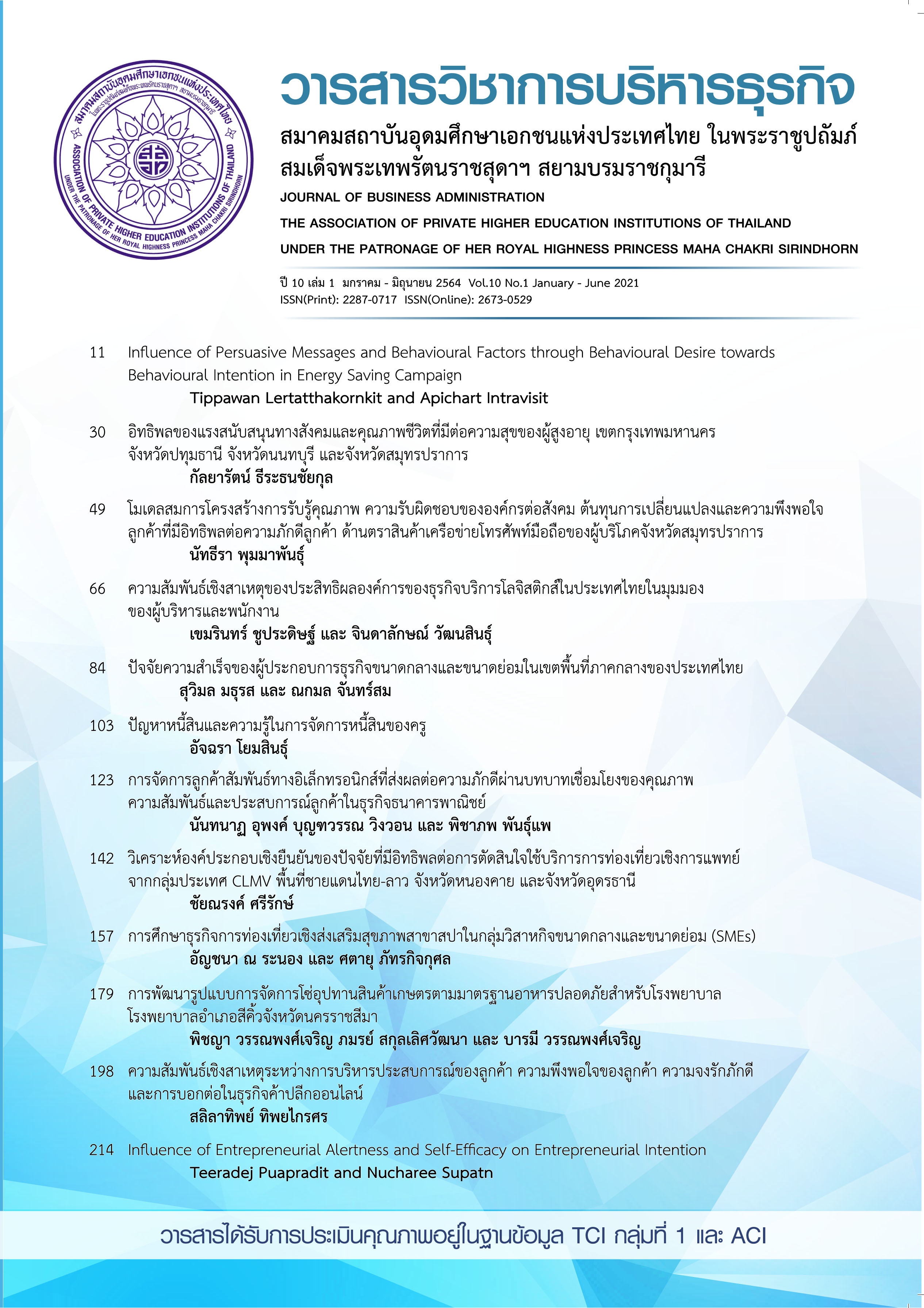Teachers’ Debt Problems and Knowledge in Debt Management
Keywords:
Debt management, financialliteracy, teacher and educational personnelAbstract
This research aimed to study the debt load, assess the level of debt literacy and debt management, and analyze the relationship between debt load and debt literacy of government teachers and educational personnel, in order to provide guideline in managing and solving problems of debt more sustainable according to the Sufficiency Economy Philosophy. Online questionnaire was used as the tools for collecting data from the sample of 612 government teachers and educational personnel in the North, Central, Southern, Northeast, and the Eastern region of Thailand.
The analysis ofdebt situations revealed that teachers’ debt load as measured by the debt to assets ratio of teachers (1.5 times) is much higher than the standard criteria (should not exceed 0.5 times). The results of the measurement of basic knowledge on debt showed that most teachers had a “low” level of knowledge of debt. From the hypothesis testing using the Binary Probit Regression Model, it was found that government service life, household expenditures, and debt literacy level affect the teachers’ debt load with statistical significance at the level of 0.05,which the debt literacy level affect the likelihood of debt load in the opposite direction. The basic knowledge of debt that teachers should know is the compounded interest, the ability to repay debts each month that should not exceed 40% of their monthly income, and the debt load or debt to assets ratio should not exceed 50% of their assets.
References
Bank of Thailand. (2017).Thai Financial Literacy Survey in 2016.Retrieved from https://www.1213.or.th/th/aboutfcc/knownfcc/Documents/ThaiFLsurvey59.pdf
Bank of Thailand. (2019). Financial Disciplineof Thai Households and Bank of Thailand’s Role in Solving Households’ DebtProblems. Retrieved from https://www.bot.or.th/Thai/MonetaryPolicy/MonetPolicyComittee/MPR/BOX_MPR/BOX_2_3_MPR_TH_Mar19.pdf
Benyasriawat, P. (2018). Money Management: The Case Study of Money Behavior, Attitude, and Knowledge of Employees with Less Than Five Years of Working Experience. Journal of Business Administration,7(2), 77-93.
Brown, M., & Graf, R. (2013). Financial Literacy, Household Investment and Household Debt: Evidence from Switzerland. Working Paper on Finance 13-1. University of St. Gallen, St. Gallen, Switzerland.
Chansom, N. (2010). Personal Financial Managementfor Sufficiency. Bangkok: Center for Sufficiency Economy Study. National Institute of Development Administration. Retrieved from http://sudsesc.nida.ac.th/main/images/books/cover-Nada.pdf
Cwynar, A., Cwynar, W., &Wais, K. (2017). Debt Literacy and Debt Literacy Self-Assessment: The Case of Poland. Journal of Consumer Affairs, 53(1), 24-57.
Dhammapiya, P. (2015). 1997 Economic Crisis and the Sufficiency Economy Philosophy. (4th ed.) Bangkok: Sufficiency School Center, Foundation of Virtuous Youth.
Disney, R., Bridges, S., &Gathergood, J. (2008). Drivers of Over-indebtedness. CPE Research Report. Enterprise and Regulatory Reform. England: University of Essex.
Ekarabaworkiat, P. (2018). Financial Literacy and Thai Household Over-Indebtedness. College of Asian Scholars Journal. 8, 62-70.
Intachom, N. (2011).Study the Impact Liability ofthe Military Mind Department to Support the 9th Infantry Brigade. (Master’s Thesis). Bangkok: Silapakorn University.
Kenan Institute Asia (2015).Financial Literacy Improvement for Better Finance in Thailand.Research Report. Bangkok: Kenan Institute Asia.Retrieved from https://thaipublica.org/wp-content/uploads/2015/03/1.Citi-LIFT-FL-Research-Report-THAI_Draft.pdf
Kingdee, B., &Siripanit P. (2009). Attitude Toward Indebtedness of Teachers in Public Sector. Suthiparithat Journal, 23(71), 147-160.
Kruwandee. (2018). Teachers have the Highest Debt Ranked in Thai Government Officials. Retrieved from http://www.kruwandee.com/news-id36915.html
Lusardi, A., & Mitchell, O. S. (2014). The economic importance of financial literacy: Theory and evidence. Journal of economic literature, 52(1), 5-44.
Lusardi, A., & Tufano, P. (2015). Debt literacy, financial experiences, and over-indebtedness. Journal of Pension Economics & Finance, 14(4), 332-368.
Matichon. (2020).NPLs ofTeachers’ debt is rising to 40 billion baht. Retrieved from https://www.matichon.co.th/education/news_1944534
Office of the Civil Service Commission. (2019). Government Personnel Civil Servant 2018.Retrieved from https://www.ocsc.go.th/sites/default/files/document/thai-gov-manpower-2562_0.pdf
Thai Military Bank (2018). The TMB’s Survey of Thai Financial Behavior. Retrieved from https://www.tmbbank.com/newsroom/news/analytics/view/Analytic-Financial-behavior.html
Visitwarakorn, W. (2015). Debt of Government Officers after the 2013 Salary Policy: A Case Study of the Office of the Permanent Secretary, Ministry of Natural Resources and Environment. Veridian E-Journal, Silapakorn University, 8(1),515-529.
UTCC. (2018). The Survey of Thai Household Debt Status 2018. Center for Economic and Business Forecasting, University of the Thai Chamber of Commerce. Retrieved fromhttp://cebf.utcc.ac.th/news_detail.php?typeid=&newsid=278
Wiyaporn, P. (2016).The Solving Process of the Financial Liabilities Problems of Teachers and Education Personnel. (Doctoral Thesis). Bangkok:Silapakorn University
Wongchan, R. (2012).Personal Financial Management. Bangkok: Boonsiri Publishing.
Yamane, T. (1973). Statistics: An Introductory Analysis. (3rd ed.) New York: Harper and Row.
Yomsin, A. (2009). 365 + 1 Finance and Investment Vocabulary. Bangkok: The Stock Exchange of Thailand Publishing.
Yomsin, A. (2017). Sufficiency Teachers are debt free and have a balanced life. Research Paper.Retrieved from http://202.44.73.105/finance/finance-summary.aspx#
Yoong, J. (2010). Financial Illiteracy and Stock Market Participation: Evidence from RAND American Life Panel. Working Paper. Universityof Pennsylvania: Pennsylvania.Retrieved from https://pensionresearchcouncil.wharton.upenn.edu/publications/books/financial-literacy-implications-for-retirement-security-and-the-financial-marketplace/

Downloads
Published
How to Cite
Issue
Section
License
บทความที่ลงตีพิมพ์ในวารสารวิชาการบริหารธุรกิจ สมาคมสถาบันอุดมศึกษาเอกชนแห่งประเทศไทยต้องเป็นบทความที่ไม่เคยได้รับการตีพิมพ์เผยแพร่ หรืออยู่ระหว่างการพิจารณาตีพิมพ์ในวารสารอื่นๆ การละเมิดลิขสิทธิ์เป็นความรับผิดชอบของผู้ส่งบทความโดยตรง

